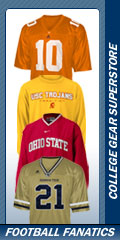 |
| SouthernCollegeSports.com |
| CONTACT SCS.com |
| SCS.com STORE |
| HOOPS FEATURES |
| TV Listings |
| HOOPS COLUMNS |
| Daniel |
| HOOPS LINKS |
| Live Scoreboard |
| Conference Standings |
| Top 25 Polls |
| FOOTBALL FEATURES |
| Free Pick'Em Contest |
| FOOTBALL COLUMNS |
| David |
| FOOTBALL LINKS |
| Live Scoreboard |
| Conference Standings |
| Top 25 and BCS Polls |
| Statistics |
| ABOUT US |
| The Work Force |
| Site Developed by AdcockDesign.com |
| HIGH SCHOOL TO THE PROS, THE EFFECT ON NCAA BASEBALL | |
| February 28, 2007 | |
| Ryan, SCS.com Guest Writer | Contact Ryan |
 Should there be a rule for baseball players coming out of high school to not be
able to play pro ball until they have completed some time in college? Of the three
major sports in college athletics, baseball is now the only one with out regulation
of when a player can play professionally. In this article, we are going to take
a look at the issue of high school athletes skipping college to play professionally
and how it affects college baseball.
Should there be a rule for baseball players coming out of high school to not be
able to play pro ball until they have completed some time in college? Of the three
major sports in college athletics, baseball is now the only one with out regulation
of when a player can play professionally. In this article, we are going to take
a look at the issue of high school athletes skipping college to play professionally
and how it affects college baseball.
Sports such as football and basketball have rules in place that state a player must complete time in college or away from high school before they can go onto the NFL or NBA. There is no such rule in baseball, and players are allowed to go directly from high school to play in professionally. In basketball, the rule requires high school players to wait at least one year after their high school class graduation before being allowed to enter the NBA draft. In football, the rule is that players must be out of high school for at least three years before they can play in the NFL.
The 2006 MLB draft consisted of 50 rounds where 1502 athletes were drafted to play professional ball. In the first round of the draft, fourteen of the thirty drafted were directly out of high school. Players drafted in the later rounds of the draft used to not sign with the teams that drafted them and went on to college to make sure their tuition was paid for in case playing in the minor leagues did not work out. Now, in order to increase the amount of players they drafted for the minor leagues to sign a contract, teams are now offering to pay their college tuition in their contracts.
When I asked some coaches around the league about their opinion on the topic, I received several different takes. University of Nebraska-Kearney's Damon Day said that, "Baseball is a different animal then the rest of the sports that you named. I do not think a rule is needed at all and that it should stay status quo because the game is different then the other two examples (basketball and football)." Day is right that baseball is different, however that does not mean a rule would not help college baseball as a whole.
First year head coach at LSU Paul Mainieri had this to say: "I don't think there should be that rule in baseball because, unlike football and basketball, the youngsters do not receive full scholarships to attend college. Some just can't afford to attend college, and signing professionally is there chance to be successful financially." Mainieri has a very valid point of how scholarships in college baseball are drastically limited and thus limits some athletes chance to play.
Mainieri went onto say "That being said, I wish the rule would be changed that would allow a professional team that drafts a player out of high school to maintain the rights to sign that player until the draft following his junior year in college. That way, I think more players would go to college first and it would allow professional teams to make a longer and better evaluation of players before signing them. As it currently stands, a professional team loses the rights to a player on August 15th prior to his freshman year. I believe this rule change would result in more players going to college."
Players drafted in the later rounds of the draft used to not sign with the teams that drafted them and went on to college to make sure their tuition was paid for in case playing in the minor leagues did not work out. Now, in order to increase the amount of players they drafted for the minor leagues to sign a contract, teams are offering to pay their college tuition in their contracts. As Maineri stated, most athletes' option at this time to be successful financially is to play professionally as they can not pay there own way in college.
If you look at a team's roster, like the Tampa Bay Devil Rays, and look at the composite of their rosters background, you would find that it is a pretty even number of players that went on to some kind of schooling after high school compared with those who went directly from high school to play professional ball. The Devil Rays 40 man roster consisted of 20 players who went directly from high school to play professionally. The number who played in college was 15 and the 5 played at the community college level.
When a player leaves high school and goes directly to playing baseball professionally, the young player can lack maturity. The player will leave the guidance and supervision at home and are suddenly given a combination of independence as well as sums of money in signing bonuses as well as contracts as they play professional ball. If a player were to attend a college or university, the player would be monitored and would be given time to mature both on the field as well as off.
An example of this lack of maturity is Devil Ray's prospect Delmon Young, who was the first overall pick in the First-Year Player Draft back in 2003. During a game on April 26, 2006, Young (who was 20 at the time) threw his bat at an umpire and struck him in the chest after Young was ejected after disputing being struck out. This was not the only incident that the Young has had during a game, as he has bumped chests with an umpire in a game as well thrown his bat in the air in the direction of a pitcher who had just hit him with a pitch.
With much of the talent coming out of high school skipping college to play professionally, it has a watering down effect on the level of talent that plays collegiate baseball. Attendance at college baseball games would increase, as would coverage of college baseball, with the talent that would need to filter through the college ranks if a rule was instituted.
Of course, it cannot be proven statistically but does this have an effect on the attendance at college baseball games? I certainly think it would boast attendance if you had the likes of a player like Alex Rodriguez, who was drafted right out of high school as the number one pick in the 1993 draft. Other high school players taken recently with the first pick in the draft include Joe Mauer (2001), Chipper Jones (1990), and Ken Griffey Jr (1987).
College basketball has recently been affected significantly after the institution on a rule requiring players to be out of high school for at least one year before going pro. Ohio State's Greg Oden was destined to skip college and go directly to the NBA but went to play college ball due to the rule. Look at the excitement and buzz about Oden and how much attention has been given to Oden, Ohio State and more importantly college basketball. Just imagine of what would of happened to college basketball if the likes of Lebron James, Kobe Bryant, or Tracy McGrady would have played just one year in college.
The same is true for college baseball that has constantly been hurt by the lack of a rule requiring high school athletes to delay entering professional baseball. With a rule in place requiring time away from high school or time in college, college baseball as a whole would reap the benefits just as college basketball has recently. It would put the sport back in the lime light and be a positive situation for almost all aspects of college baseball.
Not allowing players to go directly from high school to play professionally would also hamper some players the opportunity to play baseball at the next level (college) who otherwise possibly would not be given that chance. With the current large exodus of talent going directly to the pros out of high school, it gives some players the chance to play college baseball that possibly would not be recruited by teams if a rule was in place. This does not mean that I believe that many players in the collegiate ranks are not talented to enough to play college ball if a mandatory time out of high school were put in place. Just that each college team has a limited roster and would stiffen competition for a spot on the roster.
College baseball would have a lot to gain if a rule was put in place holding back high school talent, and as it definitely has suffered over the years in many ways without a rule.

|
SCS.com STORE
|
| ITEMS OF INTEREST |
| Write for SCS.com |
| In the Media |
| Player Testimonials |
| Audio Clip Archive |
| Team Addresses |
| Free Audio Links |
| D-I FB Location Map |
| Related Links |
| NCAA Autographs |
| SCS.com Archives |
| Advertise With Us |
| CONFERENCES |
| ACC |
| Big East |
| Big Ten |
| Big XII |
| Conference USA |
| MAC |
| Mountain West |
| PAC 12 |
| SEC |
| Sun Belt |
| WAC |
| [MORE] |
| CHRIST IN SPORTS |
| FCA.org |
| TheNCCAA.org |
| Athletes in Action |
| MoreThanWinning |
| Upward.org |
| Place your ad here. Contact SCS.com for more info. |
| Copyright © 2004-2009 SouthernCollegeSports.com. All rights reserved. This website is an unofficial and independently operated source of news and information not affiliated with any school, team, or league. |